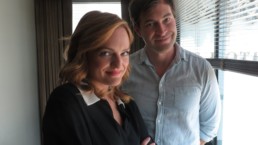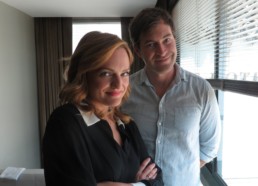Mark Duplass and Elisabeth Moss on ‘The One I Love’
"[My character] is like any girl in a relationship trying to figure out whether or not she should stay or go... we have all been there at some point and I really identified with that." -Elisabeth Moss
[soundcloud url=”https://api.soundcloud.com/tracks/163933823″ params=”color=ff5500&auto_play=false&hide_related=false&show_comments=true&show_user=true&show_reposts=false” width=”100%” height=”100″ iframe=”true” /]
The room silences when Mark Duplass and Elisabeth Moss walk into it, dressed just as they are in the picture above. Nice, but comfortable- their personalities shining through the button up shirts and pinkish shade of lipstick. The publicist asks all journalists to go around the room and state their name and outlet. “Morgan Rojas, for CINEMACY,” I declare proudly, as Duplass and Moss smile. This is the beginning of our conversation about the not-so-average indie film The One I Love, whose plot has been forbidden to talk about. Avoiding the main themes of the film, we find plenty more to discuss during our time together, which is both enlightening and obviously hilarious. We begin:
MARK, I CALL YOU THE KING OF INDEPENDENT FILM…
MARK DUPLASS: I’ll take that!
[Laughter]
I really appreciate all that. The only thing I think [I] have to offer, for better or for worse, is that [my brother and I] are known as the people who, if you can’t get your movie made for a lot of money, you can always make it with [The Duplass Brothers] really quickly and really cheaply. We can promise you two things: You’ll be broke but you’ll get to make the movie you want to make. That’s basically what we did here. I met Charlie and Justin at a time when they were struggling to get the “old version” of the independent film model made- that $5 million indie that’s just not being made. I brought them this very tiny concept and they fleshed it out into a really interesting, odd, romantic comedy.
DID YOU THINK THE MOVIE WOULD HOLD ITS SECRET REVEAL UNTIL THE RELEASE DAY? WAS THAT PLANNED?
ELISABETH MOSS: We didn’t ask for that- we thought that everybody was just going to be talking about it right off the bat and then these critics came out with their initial reviews from Sundance, saying ‘We really like this movie, we kind of don’t want to tell you what happens,’ and I think it gave Radius TWC and the producers this idea of, ‘Wait, can we do this? Can we actually get people to just go watch the movie and have the experience that they’re supposed to have,’ which is almost an old fashioned idea.
MD: This movie was made with a bunch of limits in mind, and one of those limits was, a couple of characters, a couple of locations, and let’s see how creative we can be with very limited resources…With Lizzie on board, she became quite the defender of the female voice of the film.
ELISABETH, HOW DID YOU ENJOY IMPROVISING?
EM: I love working on Mad Men and it’s probably always going to be my favorite job, but you can’t always just do the same thing over and over, so it’s nice to have this freestyle atmosphere where you feel like everything you say is listened to, or an idea you have while you’re sleeping or in the shower is something that could end up being in the movie. I haven’t really had that experience [before], so for me it broadened my horizons in a way that I really enjoyed… I was nervous about the improv at first, but I trust Mark. My favorite scene in the movie is completely scripted.
WHICH ONE?
EM: Can’t tell you!
WHAT WAS IT LIKE TO SHOOT THE FILM IN ONLY 15 DAYS?
EM: Mark is more used to it than I am…
MD: We had spent time together socially, we had pizza and beer together a couple of times and I knew- she’s an emotionally involved person, a student of the human condition, she likes people, she’s open minded- She’s going to be great. Thank God I wasn’t wrong because it would be really weird to fire your ass.
[Laughter]
EM: But this wasn’t one of those, I had done Get Him To The Greek where it’s so much about the punchline and the joke and making people laugh, and this wasn’t necessarily that. This wasn’t supposed to be every improv had to end in a joke… this was about making it real. Once I settled into the fact that I just had to be real, I wasn’t nervous anymore.
MD: And it’s not like we were anchor-less, the script was so well constructed in terms of the plotting and how [the characters] were feeling and what they were doing. It was everything but the dialogue.
I think it gave Radius TWC and the producers this idea of, ‘Wait, can we do this? Can we actually get people to just go watch the movie and have the experience that they’re supposed to have,’ which is almost an old fashioned idea.
HOW DIFFICULT IS IT TO ACT WITH JUST ONE OTHER PERSON ON SCREEN?
EM: Being asked that question was the first time that ever occurred to me, I did not feel like it was weird at all. Maybe we were moving too fast, there was so much work to do all the time. I didn’t feel limited by it at all. We barely had enough time to tell our story, so I was happy there weren’t any other actors there stealing our screen time.
[Laughter]
MD: Yeah, Lizzie’s like, ‘I’ll do this movie, but only if you’re the only other person in it!’ No more people!
EM: I no longer work with more than one actor.
[Laughter]
MD: I felt similarly, it wasn’t a lonely experience. We’re playing so many different shades, so much was asked of us as actors in this movie so it was hard enough keeping up with just the one character.
HOW DID YOU APPROACH YOUR CHARACTER?
EM: A good way to talk about it, without giving too much away, is the person that you present as yourself at the beginning of a relationship as opposed to the person that you end up becoming, which is really the person that you are, and we explored that so much in our initial conversations and getting together and talking about everything. On set everyday, we were just trying to figure out what was the ideal person. What are those qualities that everyone is looking for… what are the faults this couple has? There was all this exploration of the ideal traits that you would want in a partner, and it provided for a lot of interesting conversations about men and women and what men think that women want in men, and what women actually want in men, which is apparently really different.
[Laughter]
MD: You say that but I’m not so sure…
WHAT DID YOU LIKE ABOUT YOUR CHARACTER?
EM: It’s funny, in a way there are parts of her that are the most similar to me that I’ve ever played, which you would think would be easy but in a way it’s actually a challenge to allow yourself to bring [out] those parts of yourself- you tend to hide behind characters, so in a way it’s challenging to actually have to be yourself a little bit. Then, of course, there were elements that were very different than me.
[My character] is like any girl in a relationship trying to figure out whether or not she should stay or she should go, whether or not this is working. Should she fight for it, or cut her losses and go find someone better, and I think man, women, whatever, we have all been there at some point in relationships and I really identified with that. That’s why I think couples and people seeing this movie will identify with it when they see it.
MARK, WHAT WAS IT LIKE NOT BEING THE DIRECTOR ON THIS FILM?
MD: One of my favorite things to do is produce and act in films that I’m lucky enough to have a creative hand in, and shepherd filmmakers like Charlie and Justin into a new way of making movies cheaply and fun like I do, but then at a certain point take the training wheels off and be like, ‘It’s your movie guys, I’ll support you when you need it,’ but they were so great at taking the reigns from me. In that way, it’s the difference between being like a parent to children that you constantly have to worry about and look out for. This is more like being the fun, drunk uncle that comes by who plays with them for a few hours and then is like, ‘Ok, your problem now, I’m going home.’
HOW WAS CHARLIE AS A FIRST TIME DIRECTOR?
EM: I’ve seen plenty of people who have professional actors as parents and they aren’t good at what they do, and I think [his upbringing] allowed Charlie to have that sense of comfort as far as being physically on set, but that doesn’t make you a great director. I think his own talent has given him the chops for this job, wouldn’t you agree?
MD: I totally agree, and I would say it was really fun to watch Charlie tell his stepdad what to do. It’s always nice to see a little role reversal.
ONE SPECIAL MOMENT IN THE FILM FOR ME WAS THE LINE, “HAPPINESS IS SOMETHING WE HAVE TO RECREATE,” WHAT WAS HAPPINESS FOR YOU ON SET?
MD: I know what it was for you (points to Moss).
EM: Hahah!
MD: Playing Catch Phrase after we shot.
EM: Yeah!
MD: We all lived and shot in the same location, so we’d have a big dinner together outside with our whole 25 person cast and crew. We would have diner, we discussed what we shot, what needed to happen tomorrow, down a couple bottles of wine and by the time we got a little too drunk to actually discuss the movie, Catch Phrase would come out, and Lizzie would lead these epic, epic rounds of Catch Phrase.
EM: Oh, it was so much fun.
MD: I never outlasted you, I was always in bed first.
EM: Yeah, cause you’re a professional.
[Laughter]
EM: Then I took it to Mad Men and they became obsessed with it and we played it the entire last season.
Morgan Rojas
Certified fresh. For disclosure purposes, Morgan currently runs PR at PRETTYBIRD and Ventureland.


